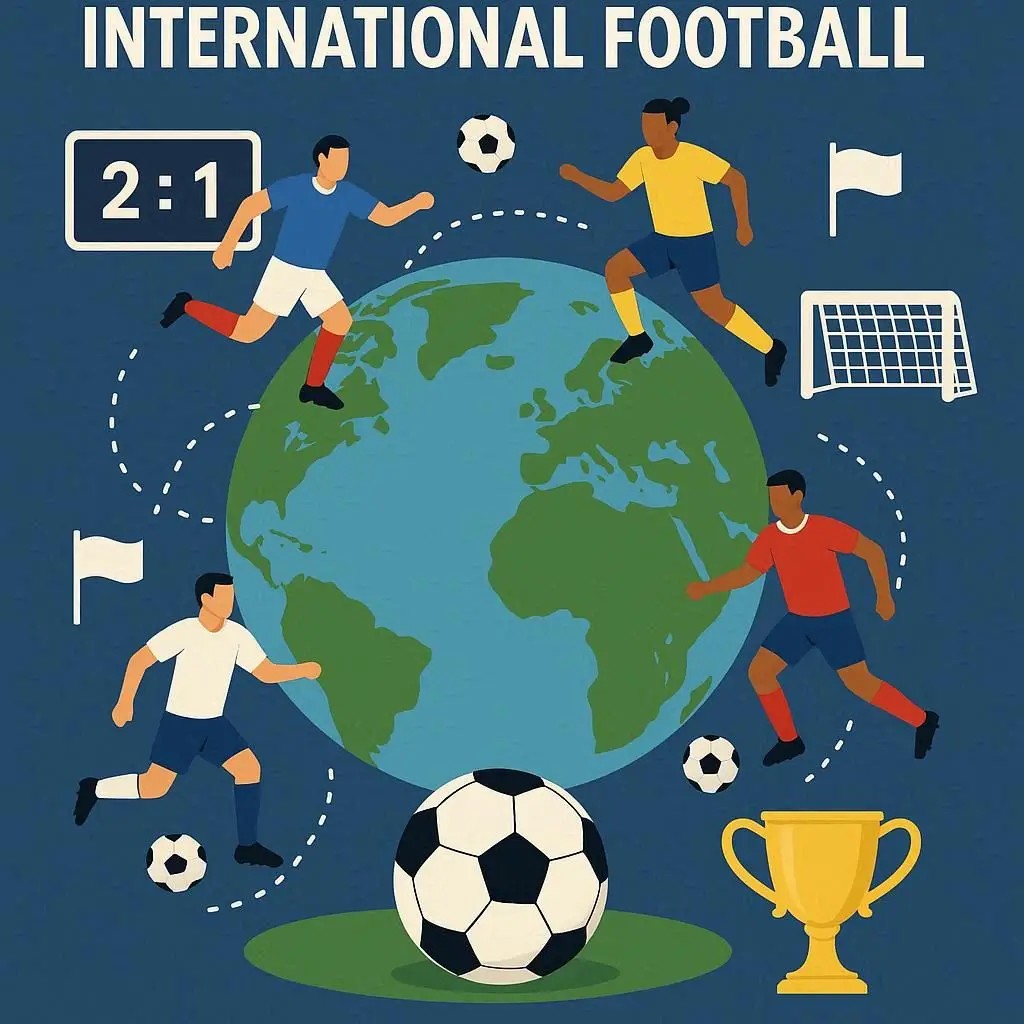What is international football?
Here’s a clear explanation of international football and its global context:
What is International Football?
International football refers to the version of soccer (association football) played between national teams rather than club teams. It is governed globally by FIFA (Fédération Internationale de Football Association), and regionally by confederations like UEFA (Europe), CONMEBOL (South America), CAF (Africa), AFC (Asia), and CONCACAF (North/Central America & Caribbean).
Key Features of International Football
National Representation
Players represent their home country, not their club teams.
Selection is based on nationality and performance.
Major Competitions
FIFA World Cup: Held every four years; the most prestigious international tournament.
Continental Championships:
UEFA European Championship (Europe)
Copa América (South America)
Africa Cup of Nations (Africa)
AFC Asian Cup (Asia)
CONCACAF Gold Cup (North/Central America & Caribbean)
Olympic Football: Primarily for under-23 players with limited overage players.
Friendly Matches
National teams often play friendlies for practice, team building, and ranking purposes.
Global Impact
International football promotes national pride, cultural exchange, and global sports diplomacy.
It attracts billions of viewers, making it a major part of global sports culture.
Differences from Club Football
| Feature | International Football | Club Football |
|---|---|---|
| Team | National teams | Club teams (e.g., Barcelona, Manchester United) |
| Frequency | Less frequent; major tournaments every 2–4 years | Weekly league matches & seasonal tournaments |
| Player Eligibility | Based on nationality | Based on club contracts |
| Audience | Global, national pride-focused | Local & international fans, commercial-driven |
Summary:
International football is the highest level of national competition in soccer, where players compete for their countries in tournaments like the World Cup and continental championships. It unites fans worldwide, showcasing both talent and national identity.
International football refers to football (soccer) matches played between national teams, representing their respective countries. These competitions are a cornerstone of the sport, bringing together the best players from different nations to compete for global and continental glory.
What Is International Football?
International football encompasses all matches where national football teams, organized under their respective national football associations and affiliated with FIFA (Fédération Internationale de Football Association), compete against each other.
How Are International Football Matches Organized?
The organization of international football matches falls under the purview of FIFA and its six continental confederations:
AFC (Asia)
CAF (Africa)
CONCACAF (North, Central America, and Caribbean)
CONMEBOL (South America)
OFC (Oceania)
UEFA (Europe)
These bodies govern the rules, regulations, and scheduling of matches. Organization typically involves:
Fixture Planning: Creating a calendar of matches for friendly games, qualification rounds, and final tournaments.
Logistics: Arranging travel, accommodation, and training facilities for teams.
Refereeing: Appointing qualified match officials from a neutral country.
Venue Selection: Choosing appropriate stadiums that meet international standards.
Broadcasting and Commercial Rights: Managing the media coverage and sponsorship agreements.
International matches are categorized as either friendlies, which are exhibition games with no competitive stakes, or competitive matches, which are part of qualification campaigns or major tournaments.
What Are Major International Football Competitions?
The world of international football is defined by several prestigious competitions:
FIFA World Cup: This is the pinnacle of international football, held every four years.
It brings together 32 (soon to be 48) national teams from across the globe to compete for the title of world champions. It is the most-watched sporting event globally. Continental Championships: Each confederation hosts its own major tournament:
UEFA European Championship (Euro): For European nations.
Copa América: For South American nations.
Africa Cup of Nations (AFCON): For African nations.
CONCACAF Gold Cup: For North, Central American, and Caribbean nations.
AFC Asian Cup: For Asian nations.
OFC Nations Cup: For Oceanian nations.
Olympic Games Football Tournament: A multi-sport event that includes a football competition, typically featuring age-restricted national teams (mostly Under-23).
FIFA Confederations Cup (defunct): Previously a tournament involving continental champions, but it has been discontinued.
Various Youth World Cups: Including the FIFA U-20 World Cup and U-17 World Cup.
How Do National Teams Qualify for International Tournaments?
Qualification for major international tournaments like the FIFA World Cup or continental championships is a rigorous and lengthy process, often spanning several years.
Continental Qualification Rounds: Teams compete within their respective continental confederations. These rounds involve group stages, play-offs, and sometimes multiple phases, with teams earning points based on wins and draws.
Allocation of Spots: FIFA and each confederation determine the number of qualification spots allocated to each continent based on factors like the number of member associations and competitive strength.
Play-offs: Some qualification pathways include intercontinental play-offs, where teams from different confederations compete for a final few spots.
Host Nation: The host nation(s) of a tournament typically automatically qualify, though this can vary for some competitions (e.g., Olympics).
The qualification system ensures that only the strongest and most consistent teams earn a place in the final tournaments.
What Are the Rules and Regulations in International Football?
The Laws of the Game are the bedrock of international football, maintained by the International Football Association Board (IFAB).
The Field of Play: Specifications for dimensions, markings, and goals.
The Ball: Requirements for size, weight, and material.
The Players: Rules regarding number of players, substitutions, and equipment.
The Referee: The ultimate authority on the field, ensuring adherence to the laws.
Duration of a Match: Two halves of 45 minutes each, with a half-time interval, plus any added stoppage time.
Start and Restart of Play: Kick-offs, throw-ins, goal kicks, corner kicks, free kicks, penalty kicks.
Fouls and Misconduct: Rules defining fouls, yellow cards (cautions), and red cards (ejections).
Offside: A complex rule designed to prevent players from gaining an unfair advantage by positioning themselves too far forward.
Goal Scored: When the ball completely crosses the goal line between the posts and under the crossbar.
Video Assistant Referee (VAR): Increasingly used in major international competitions to review clear and obvious errors or serious missed incidents in game-changing situations (goals, penalties, red cards, mistaken identity).
All participating national associations and players are expected to adhere strictly to these laws, as well as additional regulations set by FIFA and the continental confederations concerning fair play, anti-doping, and ethical conduct.













